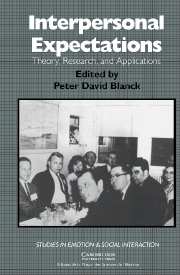Book contents
- Frontmatter
- Contents
- Preface
- List of contributors
- Introduction
- 1 Interpersonal expectations: Some antecedents and some consequences
- 2 Systematic errors to be expected of the social scientist on the basis of a general psychology of cognitive bias
- Part I Research on interpersonal expectations
- Part II Research on the mediation of interpersonal expectations through nonverbal behavior
- Part III The study of interpersonal expectations
- Author index
- Subject index
- Studies in Emotion and Social Interaction
2 - Systematic errors to be expected of the social scientist on the basis of a general psychology of cognitive bias
from Introduction
Published online by Cambridge University Press: 23 December 2009
- Frontmatter
- Contents
- Preface
- List of contributors
- Introduction
- 1 Interpersonal expectations: Some antecedents and some consequences
- 2 Systematic errors to be expected of the social scientist on the basis of a general psychology of cognitive bias
- Part I Research on interpersonal expectations
- Part II Research on the mediation of interpersonal expectations through nonverbal behavior
- Part III The study of interpersonal expectations
- Author index
- Subject index
- Studies in Emotion and Social Interaction
Summary
Preamble: Interpersonal expectation has turned out to be a crucial aspect of the new social psychology of science. Indeed, Robert Rosenthai's first studies of powerful effects of interpersonal expectations are in his extensive program of experiments on the social psychology of experimentation.
Belatedly, we are attempting to consolidate a new field, the psychology of science (e.g., Gholson, Shadish, Neimeyer, & Houts, 1989) and, more particularly, the social psychology of science (e.g., Shadish, 1992). This field should include not only speculative extrapolations of social cognitive principles to the activities of scientists, not only analogue experiments in which undergraduates in lab sessions work on tasks designed to capture aspects of scientific decision making, not only empirical studies using history of science exemplars as the data base, but also, were it possible, meta-experiments - experiments with the very process of science itself. Rosenthal is not only the pioneer in this area (e.g., Rosenthai, 1976, summarizing experiments going back to 1958), he also has done the great majority of all such experiments. He is Mr. Experimental Social Psychologist of Science himself. This book (or, given Rosenthal's relative youth, the next one dedicated to his achievements) should have had a chapter on “Interpersonal Expectations of Experimenters and Research Participants (a.k.a. ‘Subjects') as Sources of Bias in Laboratory Experimentation.” The present chapter is not that but is intended to celebrate the achievement.
The social psychology of science joins the sociology of science and the new externalist history of science in placing great emphasis on social contexts and the life world of scientists.
- Type
- Chapter
- Information
- Interpersonal ExpectationsTheory, Research and Applications, pp. 25 - 42Publisher: Cambridge University PressPrint publication year: 1993
- 3
- Cited by



